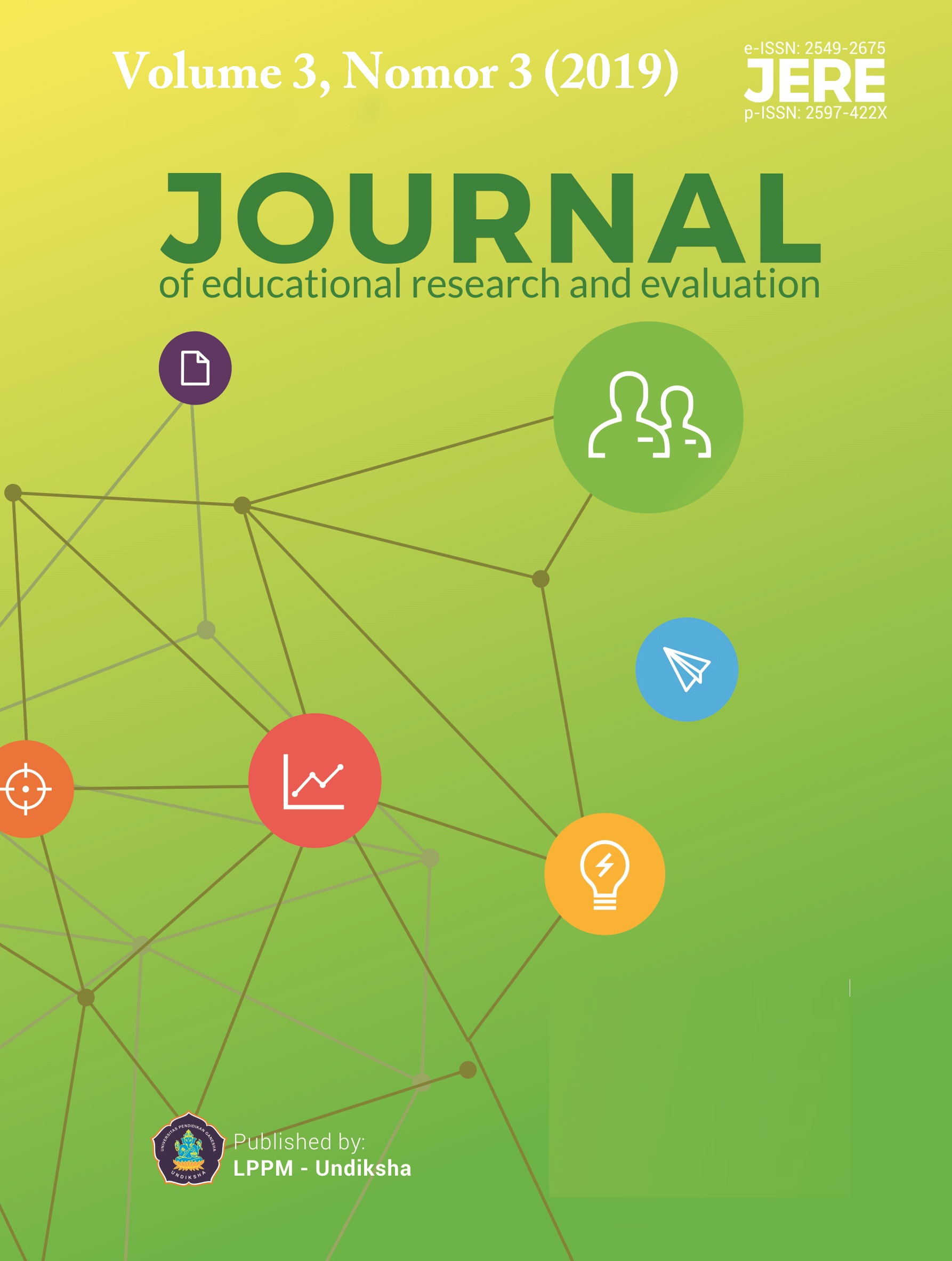Evaluation of Vocational School Pratic Program CIPP Model
DOI:
https://doi.org/10.23887/jere.v3i3.21860Keywords:
Context, Input, Process, ProductAbstract
The implementation of the vocational field work practice program is not in line with school expectations, the school still faces difficulties in finding a place to work in accordance with the expertise of students, the supervisor does not periodically monitor the business world of industry, lack of student discipline, the results of the field work practice program is declining, and the evaluation of field work practice programs has never been done at the Ketaping Aviation Vocational School. This study uses the CIPP program evaluation model (Context, Input, Process, Product) with a combination of balanced mixed model research methods and implemented at SMK. Qualitative research respondents were the head of the field work practice program, the head of the safety program, the supervisor, the field instructor. Quantitative research sample is class XII students who carry out practical work program in semester 3 a total of 45 samples. Data collection techniques data collection through questionnaires, documentation and interviews. Data analysis techniques were carried out on each quantitative and qualitative method, then the results of the analysis were combined to find mutually reinforcing or conflicting data and deepen the finding data. The research findings show that the context component is in the good category Input components are obtained by enough categories, the process components are obtained by enough categories and the results components are obtained by enough categories. It can be concluded that the field work practice program of Ketaping Aviation School is of sufficient value so that it needs improvement in all aspects of the components.References
Ambiyar & Mugarika (2019) Metodologi Penelitian Evaluasi Program. Bandung: PT. Alfabeta.
Basrowi & Suwandi.(2012). Memahami Penelitian kuantitatif dan Kualitatif. Jakarta: PT. Rineka Cipta.
Crawford, John. (2000). Ed. 2. Evaluation of Libraries and Information Services. London : Aslib, the association for information management and information management international.
Creswell, John W. (2009). Research Design Qualitative, Quantitative, and Mixed Method Approaches. United States of America: Sage Publications. Inc.
Departemen Pendidikan Nasional. (2008) Pelaksanaan Prakerin. Jakarta: DirektoratPembinaan Sekolah Menengah Kejuruan. Dirjen Manajemen Pendidikan Dasar Dan Menengah.
Esin Sintawati dan Dwi Agus Sudjimat, (2014). Evaluasi Program Praktik IndustriMahasiswa Program Studi Tata Busana Jurusan Teknologi Industri Fakultas Teknik Universitas Negeri Malang Berdasarkan Model Cipp. Jurnal Teknologi dan Kejuruan . 5 (1), 12-15. Universitas Negeri Malang.
Farida Yusuf Tayibnapis. (2013). Evaluasi Program. Jakarta: PT. Rineka Cipta.
Ganefri, Dan Hendra Hidaya. (2013). Perspektif Kurikulum Pendidikan Kejuruan. Padang: Teknik Elektro FT UNP.
Iskandar, (2009). Metodologi Penelitian Kuantitatif. Jakarta: Gaung Persada Press.
Kuswana, Sunaryo. (2013). Dasar-dasar Pendidikan Vokasi dan Kejuruan. Bandung:
Putu Sudira dan Irwanti Dwi Yowanita, 2014. Evaluasi Uji Kompetensi Siswa Keahlian Multimedia di SMK Se-Kota Yogyakarta. Jurnal Pendidikan Vokasi. 4(3).UNY.
Sadewa Aji W dan Nur Kholis, (2015). Evaluasi Program Praktik Kerja Industri Pada Bidang Keahlian Teknik Instalasi Tenaga Listrik di SMK Swasta Se-Kabupaten Sleman. Jurnal Pendidikan Teknik Elektro. 5(3). UNY.
Stuffelbeam, D.L., & Shinkfield, A.J. (2007). Evaluation Theory, Models, & Aplications. United States: Jossey-Bass.
Sudjana, (2011). Evaluasi Program Pendidikan Luar Sekolah. Bandung: PT. Remaja Rosdakarya.
Sugiyono, (2011). Metode Penelitian Kombinasi (Mixed Methods).Bandung: Alfabeta.
Suharsimi Arikunto, (2004). Evaluasi Program Pendidikan, Jakarta: PT Bumi Aksara.
Suharsimi Arikunto,(2006). Prosedur Penelitian Suatu Pendekatan Praktik. Jakarta:PT.Rineka Cipta.
Suharsimi Arikunto, dan Cepi Safrudin Jabar. 2009. Evaluasi Program Pendidikan. Jakarta: Bumi Aksara.
Supadi, (2017). Evaluasi Program Praktik Kerja Industri di Siswa Sekolah Menenga Kejuruan(SMK). Jurnal Teknologi Pendidikan,19(3), Universitas Negeri Jakarta.
Tursina. (2011). Evaluasi Program Praktik Kerja Industri Luar Negeri SMK Negeri 9 Padang Dengan Model CIPP. Tesis. Padang: Universitas Negeri Padang.
Undang-Undang No.20 Tahun (2003). Tentang Sistem Pendidikan Nasional.
Uzer Usmar. 2003. Menjadi Guru professional. Bandung : Remaja Rosdakarya.2010. Information Needs.
Wakhinuddin, (2009). Evaluasi Program. Padang: UNP Press.
Wirawan. (2012). Evaluasi:Teori, Model, Standar, Aplikasi, dan Profesi. Depok PT Raja Grafindo Persada.
Downloads
Published
How to Cite
Issue
Section
License
Authors who publish with the Journal of Evaluation and Research in Education (JERE) agree to the following terms:
- Authors retain copyright and grant the journal the right of first publication with the work simultaneously licensed under a Creative Commons Attribution License (CC BY-SA 4.0) that allows others to share the work with an acknowledgment of the work's authorship and initial publication in this journal.
- Authors are able to enter into separate, additional contractual arrangements for the non-exclusive distribution of the journal's published version of the work (e.g., post it to an institutional repository or publish it in a book), with an acknowledgment of its initial publication in this journal.
- Authors are permitted and encouraged to post their work online (e.g., in institutional repositories or on their website) prior to and during the submission process, as it can lead to productive exchanges, as well as earlier and greater citation of published work. (See The Effect of Open Access)











